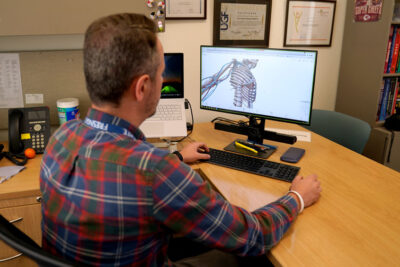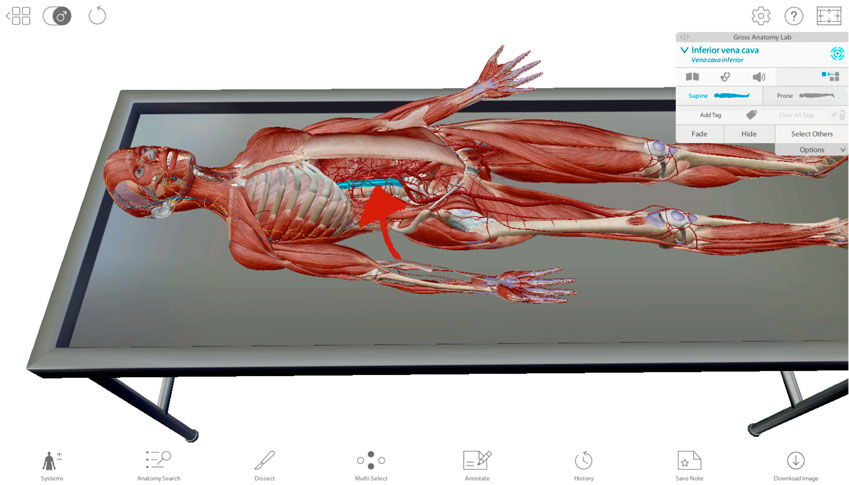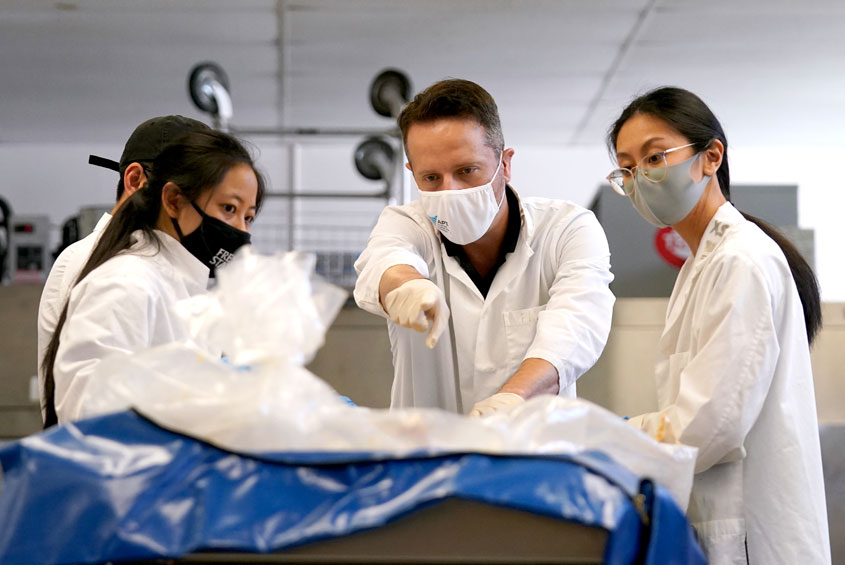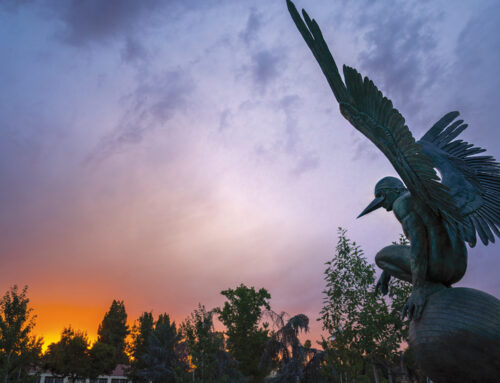VIRTUALLY IMPOSSIBLE
How one professor transitioned a physical therapy cadaver lab to online in the span of a week
By BoNhia Lee

In March 2020, physical therapy professor Dr. Caio Sarmento had to convert his cadaver dissection lab into a virtual class in the span of one week. He turned to an app called Visible Body that allows students to access interactive 3D modules, animations and augmented reality.
Dr. Caio Sarmento was faced with what seemed like an impossible task when in-person classes at Fresno State came to a halt in March 2020 — convert the cadaver dissection lab into a virtual class.
Cadaver dissection is an essential part of a physical therapy education — teaching students about the major structure of muscles and ligaments, as well as bones and their functions. Sarmento only knew how to teach the class in person.
But in the span of one week, the second-year professor in the Department of Physical Therapy transitioned the lab into a fully interactive, online course using Visible Body, an app that allows students to access interactive 3D modules, animations and augmented reality, including the dissection of cadavers.

Sarmento’s ability to adapt earned him the fall 2020 Provost’s Award for Extraordinary Teaching in Extraordinary Times in the Innovative Pedagogy category along with five other faculty and one program at Fresno State. Another eight faculty were honored in the Student Success category.
“I felt great (about this award) because I was so anxious when we had to make this transition in the spring. I was also very worried about my students. Are they going to be able to retain the information that they needed to be successful?” Sarmento says. “Even though it was a very unusual time, and I had to use a methodology that I wasn’t aware of, or familiar to me, in the end, it worked.”
Sarmento’s 34 students passed with high grades. He credits the students who persevered, and the app that is available 24/7. Students had unlimited access to cadavers via the online module instead of being restricted to learning through the three-hour-a-week course, he says.
But moving online isn’t easy, Sarmento says. It takes a lot of preparation, sometimes four or five hours before each lecture and lab starts. He also took a course offered through the Center for Faculty Excellence at Fresno State to learn how to implement teaching practices that promote student engagement, persistence and academic success.
Faculty across campus adjust
Through the Center for Faculty Excellence, and with help from the California State University and other faculty development offices systemwide, hundreds of Fresno State faculty completed online training over the past year to transition their courses for virtual learning to better engage students.
Biology professor Dr. Emily Walter took summer training to prepare for the fall 2020 semester. She is an education researcher who designs her courses, which include general education biology, to be interactive, allowing students to talk to each other about what they are learning and how it relates to their lives.
“As professors, we’re taught our content, but unlike K-12 teachers, there’s not a lot of teaching training and so people have to fall back on their experiences as learners and maybe running into the right sort of workshops to be able to make changes (in their teaching),” says Walter, who also received a Provost’s Award for Extraordinary Teaching in Extraordinary Times.
Walter felt something was missing in her syllabus this year. There needed to be something to connect students to science because so many already feel like they are not good at it, she says. She expanded her assignments to include new mini project “quests.” Students pick three from a list of more than 20 experiences that involve finding science in their everyday lives. Then, they create something using their own talents to show how it made them feel.
For example, sit out in nature and observe, do nothing for a minute, then write a poem or draw a picture. Or review and read aloud a children’s book with a female scientist or person of color. Bake an earth layer cake or a vegetarian meal.
“Students were saying how much happier they were, how much it helped them mitigate their stress,” Walter says. “I wasn’t expecting to be so personally moved by reading the students’ reflections. I don’t think I’ve ever felt that way about an assignment before.”
— BoNhia Lee is a writer in University Communications at Fresno State. Melissa Tav, communications specialist, also contributed to this story.






